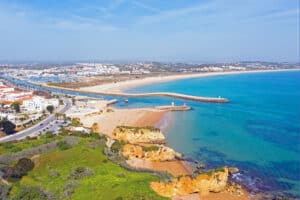Use Portugal’s D7 Passive Income Visa To Retire To The Sun

For those wanting to retire to the sun Portugal offers a great quality of life, a low cost of living as well as the attractive Non-Habitual Residence Scheme to reduce the taxes due on your overseas pension or other income. Portugal’s Passive Income Visa gives non-EU citizens an option to gain residence in Portugal.
Non-EU/EEA/Swiss citizens who wish to move to Portugal and have a reasonable net regular passive income can use the Passive Income Visa (also known as a D7 Visa) as their route to residency. The residence permit acquired does not preclude the holder from professional activity in Portugal and is mainly targeted for retirees and people living off their own foreign income (investors, freelancers, remote workers) who want to live in Portugal full-time.
The D7 visa is appropriate if you plan to become resident in Portugal and therefore subject to tax on your wordwide income. The alternative is the Golden Visa if you do not plan to spend more than 183 days a year in Portugal and can invest €250,000 or more (investment in property no longer qualifies).
Benefits of Portugal Passive Income Visa
Successful applicants for the Passive Income benefit from the following:
- The right to live, work and/or study in Portugal
- The right to include dependent children and parents in the application:
- A spouse or partner
- A minor or incapacitated child
- Children over 18, who are single and studying in an educational establishment in Portugal
- Dependent parents of the main applicant or their spouse
- Minor siblings, who are legally deemed to be in the care of the main applicant
- Visa-free travel throughout the Schengen Area of 26 European countries
- The option to take employment or establish a business in Portugal
- The option to apply for Portugal’s Non-Habitual Resident Scheme (NHR) to get
- Access to other Portugal residents’ rights, such as education, healthcare, social security etc.
The visa is initially valid for two years and can then be renewed for a further three years. After five years visa holders can apply for permanent residency or citizenship in Portugal.
The visa is intended for people who wish to live in Portugal and to be able to renew you must meet the requirement to spend at least six consecutive months in Portugal or eight non-consecutive months.
Requirements for applying for the Passive Income Visa
To apply the applicant must be able to demonstrate that they are in receipt of regular ‘passive’ income. This can be from a pension, rental, dividends or certain categories of investment income.
The minimum income requirement for the main applicant is 100% of the minimum wage (€9,840 p.a. in 2024). If a spouse or parent is included this increases by 50% of the minimum wage per person (€4,920 p.a.) and by 30% of the minimum wage for each dependent child included (€2,952 p.a.).
Application Requirements
The procedures to apply for a Passive Income Visa in Portugal are as follows:
- Obtain a Portuguese fiscal number
- Open a personal bank account in Portugal
- Secure long-term residential accommodation in Portugal (buy , rental or borrow a property)
- Apply for a D7 Visa and attend an interview with the Portuguese Consulate in their current country of residence.
The exact requirements of each consulate may vary but all consulate interviews will require the following documentation:
- Passport, valid for at least 6 months after the expiry date of the Portugal passive income visa being applied for (which will be valid for 4 months)
- Two recent passport-size colour photos
- Declaration outlining the applicant’s reason for obtaining Portuguese residency
- Health insurance policy or affidavit stating that this will be bought in Portugal within 90 days of arrival
- Criminal background check from your country of origin or from the country where you have been resident if for more than a year.
- Documentary evidence to show that the applicant has accommodation in Portugal (property title deed, rental agreement or property loan agreement)
- Documentary evidence of sufficient finances available to the applicant in Portugal (e.g. a Portugal bank statement showing a reasonable balance)
- Documentary evidence of having net regular passive income in line with the requirements.
You may also be asked to present additional documentation related to the application.
- Arrange and attend a meeting with the Immigration & Borders Service (Serviço de Estrangeiros e Fronteiras – SEF) in Portugal. After attending the meeting at the Consulate a special visa will be issued allowing for a maximum of two entries and a stay in the country of up to 4 months. This can take up to 60 days to be issued and it can take up to 120 days to arrange to get an appointment with SEF (check with your lawyer what current wait times should be expected. Once in Portugal, you will need to submit the following documents in order to apply for the residence permit:
- Passport with the special visa issued by the Portuguese Consulate
- Documentary evidence of having sufficient financial means and permanent accommodation in Portugal, as submitted to the Portuguese Consulate
- Health insurance policy if purchased in Portugal
Certified translations of all documents are likely to be required.
Once registered as a resident in Portugal it is possible to apply for Non-Habitual Resident (NHR) status. This special tax regime entitles EU and non-EU citizens who are resident in Portugal to receive most foreign income, including rental income, certain capital gains, interest and some dividends tax free for their first 10 years in Portugal. Foreign pension income used to be tax free under the scheme but is now subject to a 10% rate of tax
Related articles you may find useful: